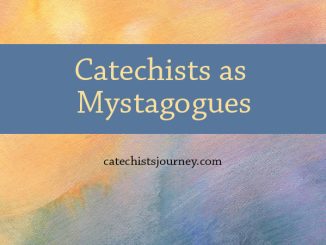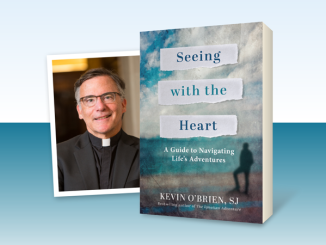
In a recent post about mystagogy, I quoted Orthodox bishop and theologian Kallistos Ware, who said, “We see that it is not the task of Christianity to provide easy answers to every question, but to make us progressively aware of a mystery. God is not so much the object of our knowledge as the cause of our wonder.” I also wrote that mystagogy is the task of becoming progressively aware of mystery.
In order to become progressively aware of mystery, we need to learn (and teach) the art of asking questions of life—questions that do not lead to easy answers but rather to a deeper appreciation of the mystery of life. The practice of mystagogy involves reflecting on an experience in our life and asking questions such as the following:
What in this experience…
- was good and beautiful?
- caught my attention?
- caused me to grow?
- revealed God’s presence?
- provoked fear, sadness, or despair?
- brought about a sense of calm, hope, or joy?
What from this experience reminds me of a…
- Scripture story?
- story from the life of a saint?
- teaching of the Church?
Next, when we connect our experience to our faith tradition, we ask questions such as:
What from this experience and from my reflection…
- might God be saying to me?
- might God be calling me to be or do?
- have I learned about God?
- have I learned about being a disciple of Jesus?
When we master the art of asking questions of life, we find that our mystagogical mind and heart enables us to work this process in reverse. In other words, when we experience liturgy or hear Scripture proclaimed, we find ourselves drawn to a moment in the liturgy (or a symbol or ritual gesture or song) or a word or phrase in Scripture that leads us to ask, What in my life does this liturgical moment, symbol, ritual gesture, or word or phrase in Scripture remind me of or make me think of and, perhaps, see differently?
By asking questions of life—and by teaching others to do the same—we become—and help others to become—progressively aware of mystery, and, thus, mystagogical!





Great post. I have been doing a lot of thinking about Mystagogic Initiation lately!
Thanks William! I’d love to hear your thoughts about mystagogic initiation!
Seems to me that, in our preparation for Confirmation, we are called to gradually lead our youth into a mystagogical approach in their faith journeys. You’ve once again provided some food for thought and session planning, Joe. Thank you!
Glad, I can help, Christina! Your “wheels are turning!”